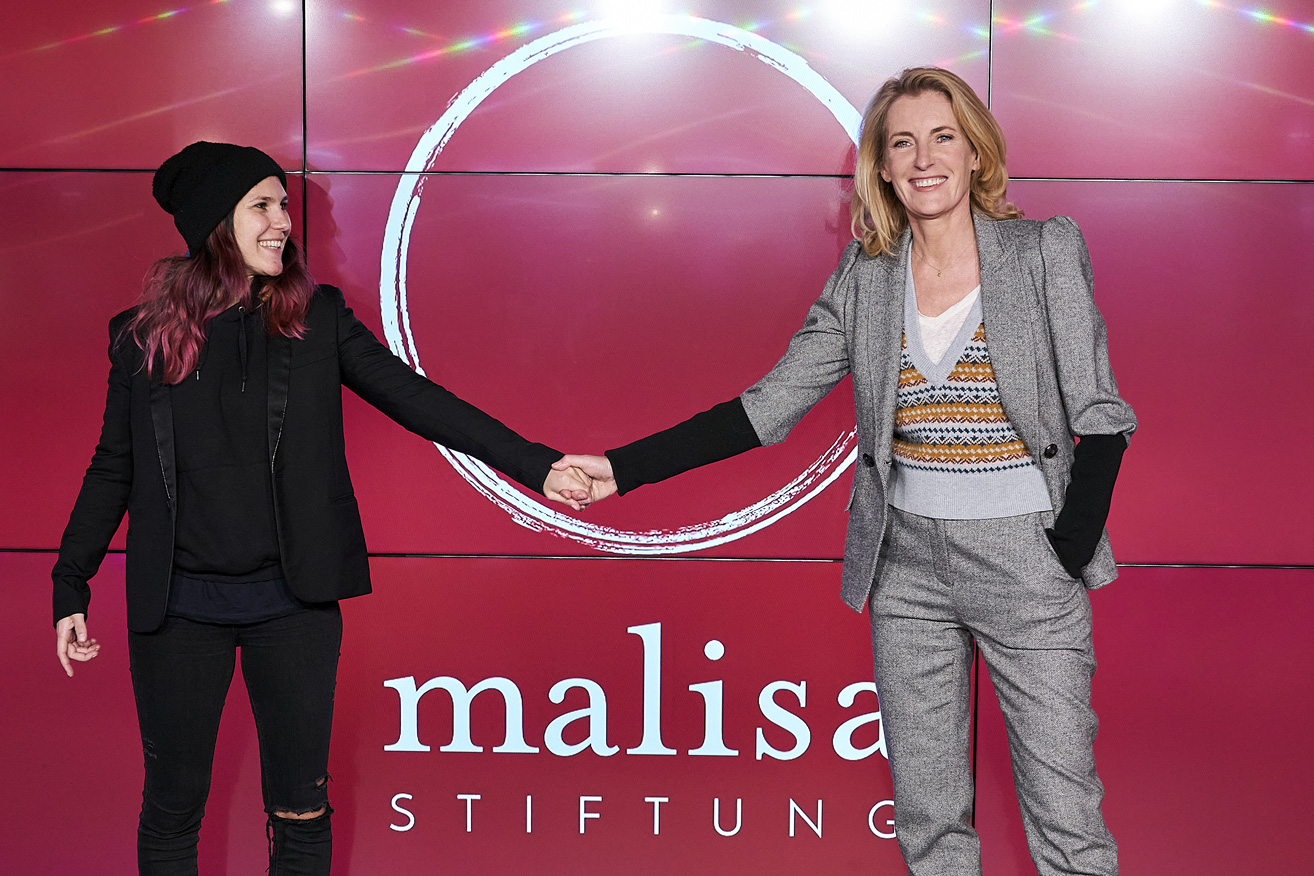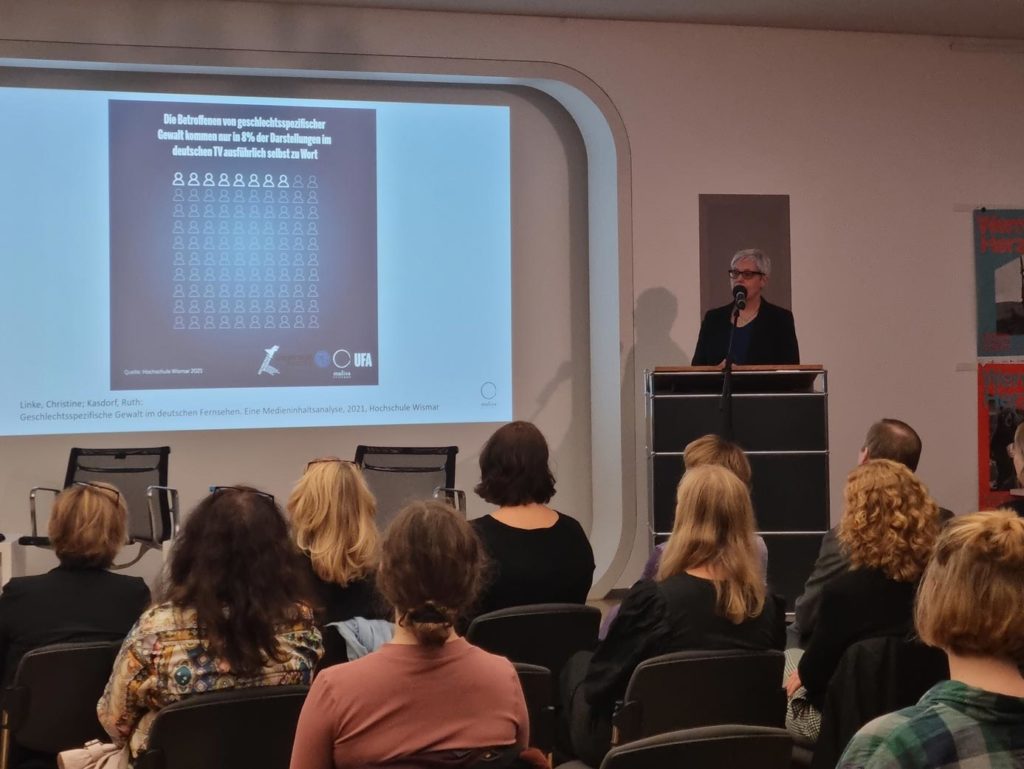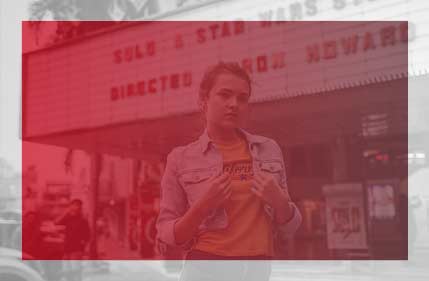Year in review 2022

Diversity in Film, Gender in Music, and Ending Violence against Women: Together with partners and allies, MaLisa Foundation took important steps in 2022 to promote diversity and gender equality. We look back on a fulfilling year with new studies, events, and many other activities.
In time for the Berlinale in February, a progress study was published on gender distribution in German film. The new results within the framework of the University of Rostock’s “Diversity and Visibility: Progress Study on Audiovisual Diversity” complement the data on diversity in television published in fall 2021.
Women continue to be underrepresented in creative roles behind the camera in German film. While films now show more women in leading roles, they do not depict the diversity of women in reality. Professor Dr. Elizabeth Prommer from the University of Rostock was particularly surprised by “how narrow the narrative corridor for female film characters still is. Men exist in many facets, women do not.”
„”More women, but not less sexism,” observed Vahabzadeh in her article on the study in the Süddeutsche Zeitung. “One could now ask: Do people really go to the movies to see the world constantly just as it really is? Of course not. Male actors also often have to conform to ideals of beauty – it’s just that the rules there are still looser and more realistic than for women.”
In March, at the conference “Sehen und gesehen werden: Participation in Film”, Professor Dr. Elizabeth Prommer presented further results of her study, which focuses on the dimensions of migration background, ethnic attribution, sexual orientation, and disability in cinema films.
Afterwards, Elizabeth Prommer, Thelma Buabeng and Maria Furtwängler discussed with moderator Boussa Thiam the imbalances in diversity on the screens of German cinemas and spoke about possible solutions.
In his text on the conference on arteschock, Sedat Aslan remarked:
“German film is still fixated on white stories of white people with white problems, and seems to have no deeper interest in breaking away from this navel-gazing.” Aslan calls for clear guidelines and commitments. “’Talent is everywhere, opportunity is not’ is one of the central phrases that emerged and resonated this weekend. The German film landscape must act on these impulses.”
In May, “Stiftung & Sponsoring” magazine published an interview with Foundation Director Karin Heisecke, in which she addressed issues surrounding feminism and philanthropy. Gender equality is still not recognized as a priority issue in many areas of society. Preventing violence against women and supporting victims, for example, is an obvious issue for foundations working in the area of social services. But few have been active on this. In the interview, Karin Heisecke discussed the situation in the German foundation sector and suggested possibilities for action.
What does feminist funding mean for the practical work of foundations? Karin Heisecke revisited this question throughout the year, including in the ImpulseStiftenwebtalk, a monthly format by and for foundations to further develop their funding practices.
An important step to promote diversity in the German film industry was announced in July: Netflix, the film academies, and the MaLisa Foundation have jointly launched an office dedicated to diversity and inclusion. The goal is to sustainably ensure a broader and more diverse group of talented creative professionals in the German-speaking world by equipping film school students with the skills for more diverse and inclusive storytelling. Kathrin Tietze was hired to fill newly created post based at the Foundation as of December 1. She brings many years of experience in implementing diversity and inclusion strategies and policies.
Founder Elisabeth Furtwängler, known as rapper and producer KERFOR, initiated the study, “Gender in Music – Charts, Works and Festival Stages”, published in September. It was conducted in cooperation with GEMA and Music S Women* and examined gender equality in the charts, in GEMA work registrations, and on festival stages.
With this step, the Foundation further expanded its focus on gender equality in the music industry, which was established in 2021 with a Study on Gender Diversity in the Music Industry and in Music Usage.
The new surveys again revealed a clear imbalance. “The music industry continues to be a boys’ club,” says Elisabeth Furtwängler, “but knowing that injustices exist is a good prerequisite for changing things.”
“Pop culture may be seen as a driver of social progress and a catalyst for emancipatory movements. But if one takes a thorough look at the conditions beyond the spotlight, sits down and calculates how things really stand, a different picture emerges,” Kristoffer Cornils commented on the results for ZEIT online.
The study results were also discussed on September 22nd as part of the Reeperbahn Festival. Anna Groß, communications officer of the Foundation and head of research, spoke with journalists and industry representatives on the panel, “The End of the Buddy Business? Who Will Shape the Music of the Future?”, addressing effective initiatives and strategies for a fairer music industry.
On that day, the MaLisa Foundation was present at Europe’s largest showcase festival with a total of four events on the subject of equal opportunities, including a highly acclaimed fem* rap and production showcase with rappers Älice, Babyjoy, Nashi44, Vita and KERFOR at the “Sommersalon” on Spielbudenplatz.
Under the banner of Gender in Music, Anna Groß further pursued the subject on panels at industry events, whether in May at the “Dialog Pop” conference, at the “Pop To Go” symposium in October, or at the music trade fair “Most Wanted: Music” and the industry meeting “Future of Festivals” in November.
Ending violence against women and girls has been the foundation’s goal since it was established in 2016. The study “Gender-Based Violence in German Television”, conducted by the Wismar University of Applied Sciences, initiated and funded by the MaLisa Foundation and UFA GmbH, and published in November 2021, provides the first representative overview of how audiovisual media portray gender-based violence. Several workshops and industry events connected to the study followed in 2022.
In cooperation with the Grimme Institut and UFA GmbH, the panel discussion “Grimme meets … Tatort Eifel – Gender-Based Violence in German Thrillers” was held on September 23 as part of the industry professions program of the “Tatort Eifel” festival. The cooperation partners also hosted the event“Gender-Based Violence on German Television” on October 25. At the Deutsche Kinemathek, journalists and creative professionals talked about the study and discussed areas where action is called for. “Television is not an educational institution – but it does not have to reinforce existing stereotypes and hierarchies,” commented Susan Vahabzadeh in her article on the event, “She Can Play the Corpse”, in the Süddeutsche Zeitung. In addition, Karin Heisecke discussed the study results on December 1 at “For Entertainment: Murder! Why Crimes Fascinate Us”, an event organized by the FSF as part of its medien impuls series.
On the occasion of the International Day to End Violence Against Women on November 25, Karin Heisecke talked about the roots of the MaLisa Foundation, the responsibility of media professionals, and a world without gender-based violence. “Any person can decide at any time not to commit violence, even if they have done so in the past,” Heisecke said. “Ending violence against women and girls is possible. It is important not to lose sight of this, but instead to see what contribution each of us can make.”
In a guest article on Focus online, the foundation’s director invites readers to imagine a world without violence against women and girls: “How will we communicate with each other, how will we behave, at home and in public spaces? What will we be able to let go, what will we start anew? And what will we do right now to move closer to that vision?”
On the foundation’s social media channels, a campaign was launched on November 25, asking what a world without violence will look like. Co-founder Maria Furtwängler, actress Natalia Wörner, and Karin Heisecke kicked off the campaign. Further statements will follow next year. We will devote ourselves to this question over the course of the coming year in order to publish a diverse collection of perspectives and visions by November 25, 2023. We look forward to working with partners, old and new friends, allies and journalists to contribute to a more sustainable and just society.
FURTHER READING


